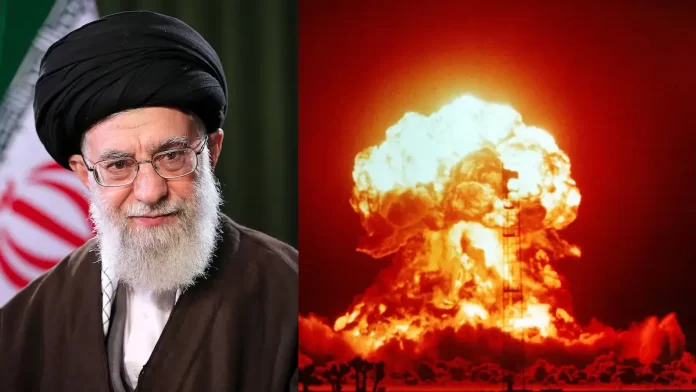The world faces renewed nuclear anxiety as Iranian officials have issued a chilling warning to the West, claiming the capability to achieve nuclear weapon readiness within just 24 hours. Mohammad-Javad Larijani, a senior Iranian official, stated Tehran could become nuclear-weapon ready within 24 hours if provoked. This assertion, coupled with increased geopolitical tensions, has reignited concerns about a potential nuclear arms race. The backdrop to this escalation includes the U.S. decision to allow Ukraine to deploy long-range American missiles against Russian targets, prompting fears of broader international ramifications.
Iranian lawmakers have consistently advocated for revising the nation’s nuclear doctrine to bolster its position against perceived threats. Speaking at a parliamentary session, hardliner Mahmoud Nabavian emphasized the importance of deterrence, suggesting that Iran must leverage any weapon to defend itself and counter its enemies effectively. Citing the Quran, he argued that the Islamic Republic is divinely mandated to build its power to instill fear in opponents, framing this as a strategic imperative to safeguard national security and sovereignty.
However, the Quran underscores the principle of defensive warfare, emphasizing restraint and justice in conflict. Verse 2:190 states, “Fight in the cause of God only against those who wage war against you, but do not exceed the limits. Indeed, God does not like transgressors.” This verse highlights the importance of self-defense while condemning aggression, reflecting Islam’s ethical framework for warfare rooted in justice and proportionality.
For decades, Iran’s nuclear ambitions have been under scrutiny. Although Tehran has maintained that its nuclear program is for peaceful purposes, revelations about clandestine research raised suspicions. The International Atomic Energy Agency (IAEA) has repeatedly flagged Iran’s enrichment of uranium beyond permissible levels, with recent estimates suggesting enrichment levels near 60%, alarmingly close to weapons-grade material.
IAEA chief Rafael Grossi recently described the situation as “grave,” warning that without proper inspections, it is increasingly difficult to ascertain the full extent of Iran’s nuclear progress. “Iran’s refusal to grant access to critical sites hampers our ability to provide assurances about its nuclear intentions,” Grossi stated.
Despite Iran’s claims of compliance with international agreements, such as the now-defunct 2015 Joint Comprehensive Plan of Action (JCPOA), the country has expanded its nuclear infrastructure significantly since the U.S. withdrew from the deal in 2018. Analysts now believe Iran possesses the technical expertise to assemble a nuclear weapon within weeks if leadership makes the decision.
Larijani’s declaration comes as a pointed message to Western nations. “If the West continues its aggression and sanctions, Iran will not hesitate to activate its full nuclear potential,” he said during a public address in Tehran. He further claimed that Iran’s deterrent power is unmatched in the region, hinting at the nation’s sophisticated missile delivery systems capable of reaching targets across the Middle East and Europe.
Larijani’s rhetoric underscores the increasing frustration within Iran’s leadership over continued economic sanctions and isolation. The regime’s threats appear calculated to pressure Western powers into revisiting the JCPOA under terms favorable to Tehran.
Iran’s announcement has drawn sharp responses from global powers. The United States, which recently authorized Ukraine’s use of advanced missile systems deep into Russian territory, warned Tehran against further escalation. Secretary of State Antony Blinken reaffirmed that Washington would not tolerate the proliferation of nuclear weapons in the Middle East.
Russia’s reaction has been more nuanced. While traditionally an ally of Tehran, Moscow’s recent doctrinal shift regarding nuclear weapon use suggests a growing unease about global instability. President Vladimir Putin recently updated Russia’s nuclear doctrine to allow preemptive strikes under specific conditions, a move widely interpreted as a response to escalating Western military aid to Ukraine.
Middle Eastern nations, particularly Israel, have expressed outright alarm. Prime Minister Benjamin Netanyahu reiterated Israel’s commitment to preventing Iran from acquiring nuclear weapons, stating, “We will act decisively, with or without international support, to neutralize any existential threat posed by Iran.”
The IAEA’s role in mediating the current crisis is crucial yet increasingly challenged. With Iran restricting access to key facilities, the agency’s ability to verify compliance with the Non-Proliferation Treaty (NPT) is severely hindered. Grossi has called for renewed negotiations between Iran and world powers, emphasizing that diplomatic solutions remain the best path forward.
However, skepticism abounds regarding Tehran’s willingness to engage in meaningful talks. Past negotiations have been fraught with delays, accusations, and unmet commitments, leaving little room for optimism.
The current situation with Iran cannot be examined in isolation. The nuclear policies of major powers like the U.S. and Russia play a significant role in shaping global attitudes toward non-proliferation. The U.S. withdrawal from the JCPOA in 2018 marked a turning point, emboldening Iran to expand its nuclear program while eroding trust in multilateral agreements.
Simultaneously, Russia’s recalibration of its nuclear doctrine following intensified conflict in Ukraine adds another layer of complexity. Analysts worry that these shifts could encourage other nations to pursue nuclear capabilities, further undermining the global non-proliferation regime.
To avert catastrophe, stakeholders must prioritize diplomacy. Experts suggest revisiting the JCPOA framework, albeit with additional safeguards and assurances to address both Western and Iranian concerns. Confidence-building measures, such as phased sanctions relief in exchange for verifiable reductions in uranium enrichment, could serve as a starting point.
Additionally, regional security dialogues involving Iran, Israel, and Gulf states may help reduce tensions and build mutual trust. International organizations like the United Nations could play a pivotal role in facilitating such discussions.
Iran’s chilling claim of being nuclear-ready within 24 hours underscores the urgent need for concerted international action. As global powers navigate an increasingly volatile landscape marked by the interplay of regional rivalries, shifting nuclear doctrines, and unresolved grievances, the risks of miscalculation loom large.
The coming months will test the resilience of global diplomacy and the international community’s ability to uphold non-proliferation principles in the face of unprecedented challenges. Whether through renewed negotiations or enhanced deterrence, the stakes demand swift and decisive action to prevent a slide into nuclear chaos.
